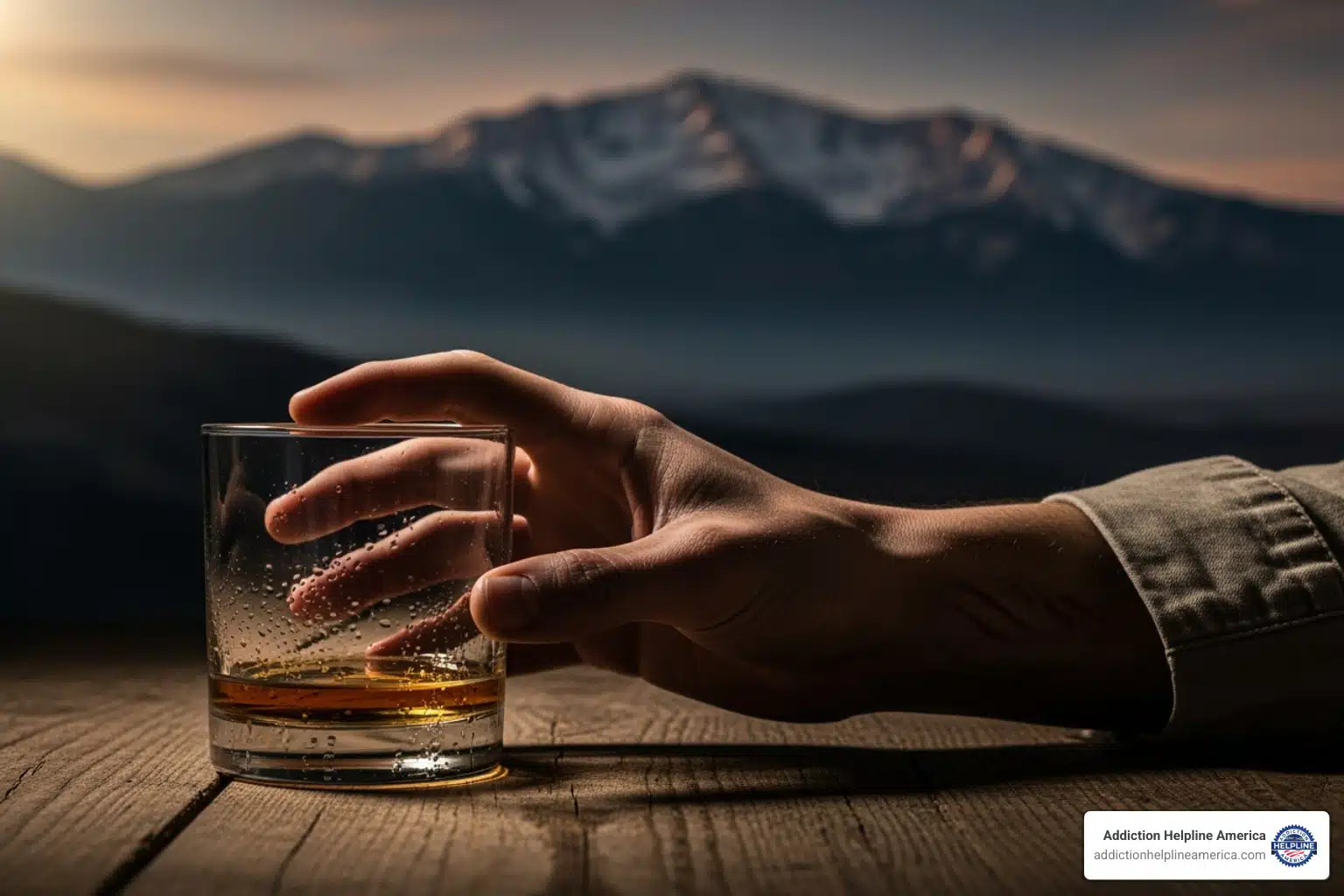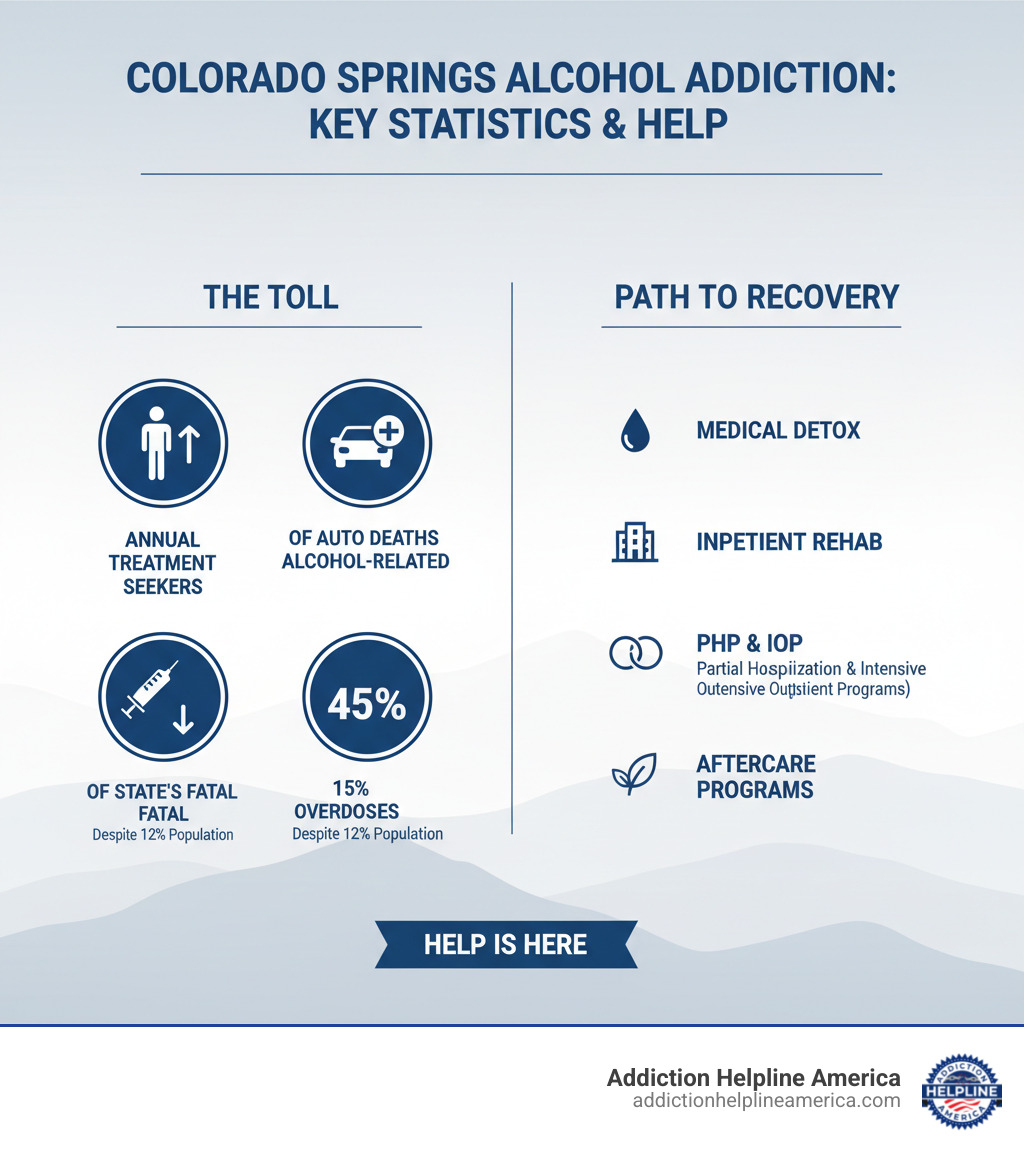
Finding Hope: Your Guide to Alcohol Addiction Treatment in Colorado Springs
Alcohol addiction Colorado Springs is a challenge faced by thousands of residents, with over 10,000 people in the Pikes Peak region seeking substance abuse treatment annually. If you or a loved one is struggling, know that you are not alone and effective help is available.
Quick Treatment Options in Colorado Springs:
- Medical Detox: Supervised withdrawal management (3-7 days).
- Inpatient Rehab: Residential programs (30-90 days).
- Outpatient Programs: PHP and IOP options while living at home.
- Support Groups: AA meetings and peer networks.
- Dual Diagnosis Care: Integrated treatment for co-occurring mental health conditions.
The statistics reveal the impact of substance use in El Paso County, where over 40% of all automobile deaths are alcohol-related. But there is also real hope. Nestled against the Rocky Mountains, Colorado Springs offers a unique healing environment with comprehensive care options for every need and budget.
Hope becomes reality through evidence-based treatment, compassionate care, and a strong recovery community. At Addiction Helpline America, we connect individuals with trusted treatment providers in Colorado Springs. Our team can help you steer insurance, find the right level of care, and connect with the support systems that make alcohol addiction Colorado Springs treatment successful.
The Landscape of Alcohol Addiction in Colorado Springs
Colorado faces significant challenges with substance misuse, ranking seventh in the nation for drug and alcohol addiction. Here in Colorado Springs, the problem is acute. Despite having only 12% of the state’s population, our city accounts for a disproportionate 15% of fatal heroin overdoses, revealing a broader pattern of substance abuse that includes alcohol addiction Colorado Springs residents face daily.
On our roads, over 40% of all automobile deaths in El Paso County are linked to drugs and alcohol. These aren’t just numbers; they represent preventable losses in our community. Military families also face unique challenges, as deployment stress and combat trauma can contribute to alcohol dependency.
However, the natural environment of Colorado Springs offers a powerful backdrop for healing. Many find that the serene mountain setting helps them gain perspective and focus on recovery, away from daily triggers. With over 10,000 residents seeking treatment annually, the city has become a hub for recovery resources. If you’re concerned about your own drinking, you can take a free online screening to confidentially assess your use.
Signs and Symptoms of Alcohol Addiction
Alcohol Use Disorder often develops gradually. Recognizing the signs is the first step toward getting help for alcohol addiction Colorado Springs.
- Behavioral Changes: Increased irritability, secrecy about drinking, neglecting work or family commitments, and legal issues like DUIs.
- Physical Signs: Morning shakes, slurred speech, poor hygiene, weight changes, and needing more alcohol to get the same effect (increased tolerance).
- Psychological Symptoms: Worsening anxiety or depression, unpredictable mood swings, memory blackouts, and feelings of guilt or shame about drinking.
- Social Withdrawal: Avoiding activities that don’t involve alcohol, isolating from friends and family, or changing social circles to include other heavy drinkers.
- Withdrawal Symptoms: When trying to stop, experiencing nausea, sweating, headaches, and in severe cases, seizures. The fear of withdrawal often perpetuates the cycle.
- Inability to Quit: Making repeated, unsuccessful attempts to stop or control drinking despite a genuine desire to do so.
If these signs are familiar, please know that recovery is possible.
The Role of Mental Health and Co-Occurring Disorders
Alcohol addiction Colorado Springs rarely exists in a vacuum. It often co-occurs with mental health conditions like depression, anxiety, or PTSD, a situation known as a “dual diagnosis.”
Many people begin drinking to self-medicate emotional pain. Alcohol may temporarily numb anxiety or sadness, but because it’s a depressant, it ultimately worsens these conditions, creating a vicious cycle. For our military community, alcohol is often used to cope with combat trauma or PTSD, providing a temporary escape from painful memories.
Effective treatment must be integrated, addressing both the addiction and the underlying mental health issue simultaneously. Treating only one problem rarely leads to lasting success. The best alcohol addiction Colorado Springs programs assess for co-occurring disorders from the start and create a holistic plan that treats the whole person—biologically, psychologically, and socially.
Navigating Treatment Options in the Pikes Peak Region
Taking the first step toward recovery from alcohol addiction Colorado Springs takes courage. The journey often begins with a confidential phone call to a helpline, your doctor, or a treatment center. This initial outreach opens the door to a new chapter.
Next, you’ll undergo a clinical assessment with a professional to understand your unique situation, including your drinking history, health, and any co-occurring mental health challenges. This is a judgment-free process designed to create a personalized treatment plan custom to your specific needs and goals.
When choosing a center, ask key questions about their:
- Levels of care (detox, inpatient, outpatient, aftercare)
- Licensing and accreditation (Joint Commission, CARF)
- Therapeutic approaches (evidence-based therapies like CBT, DBT)
- Staff credentials and experience
- Insurance and payment options
- Aftercare support programs
Levels of Care for Alcohol Addiction
Understanding the different levels of care for alcohol addiction Colorado Springs treatment helps you find the right fit. Recovery often involves moving through these levels as your needs change.
- Medical Detoxification: The first step for many, providing 24/7 medical supervision to safely manage withdrawal symptoms. Alcohol withdrawal can be dangerous, and professional oversight is crucial.
- Inpatient Residential Rehab: An immersive program where you live at the facility for 30-90 days. This provides a structured, trigger-free environment to focus entirely on recovery through therapy and building healthy habits.
- Partial Hospitalization Programs (PHP): A step-down from inpatient care. You attend treatment during the day (usually 5 days a week) but return home or to a sober living environment at night.
- Intensive Outpatient Programs (IOP): Offers more flexibility, with treatment sessions 3-4 days a week for a few hours. This allows you to maintain work or family commitments while receiving robust support.
- Standard Outpatient Programs: Typically involves weekly therapy sessions and is best for those with strong support systems or as a step-down from more intensive care.
- Aftercare and Sober Living: Ongoing support after formal treatment ends, such as support groups (e.g., AA) or living in a substance-free home. Studies show aftercare improves long-term outcomes and is vital for sustained sobriety.
Finding the Right Center for Alcohol Addiction in Colorado Springs
Choosing the right treatment center is a critical decision. Here’s what to look for in your search for alcohol addiction Colorado Springs care.
Look for facility accreditation from respected bodies like the Joint Commission or CARF, which signals high standards of quality and safety. Ensure the center uses evidence-based therapies like Cognitive Behavioral Therapy (CBT) and Dialectical Behavioral Therapy (DBT), which are proven to be effective.
The credentials of the staff are also vital. You want licensed, compassionate professionals who specialize in addiction. Finally, consider the environment. Whether you prefer luxury amenities or a more basic, home-like setting, the majestic backdrop of the Rocky Mountains provides a uniquely therapeutic atmosphere for healing.
We at Addiction Helpline America have vetted providers throughout Colorado Springs and can help you find a center that fits your needs. Contact Addiction Helpline America to find trusted providers in Colorado Springs.
Practical Considerations for Recovery
Beginning your recovery from alcohol addiction Colorado Springs involves practical and legal considerations. While some centers report high completion rates, it’s important to understand that relapse can be a part of recovery for many. Relapse rates for substance use (40-60%) are similar to those for other chronic diseases like diabetes. It is not a failure, but a sign that your treatment plan may need adjustment.
Understanding the legal aspects of alcohol use is also key to maintaining sobriety. Colorado’s DUI laws are strict, with a blood alcohol concentration (BAC) of 0.08% defining legal impairment. A DUI conviction can lead to fines, license suspension, and mandatory therapy. Given that over 40% of auto deaths in El Paso County are alcohol-related, these laws are critical for community safety.
Importantly, Colorado’s 911 Good Samaritan Law provides immunity from prosecution for those who report an overdose emergency. This law encourages people to seek help in a crisis without fear, prioritizing saving lives.
Costs Associated with Alcohol Addiction in Colorado Springs
Concerns about the cost of alcohol addiction Colorado Springs treatment should not prevent you from seeking help. Costs vary widely based on the program type, duration, and level of amenities, but options are available for nearly every budget.
| Program Type | Typical Cost Range (per month) |
|---|---|
| Inpatient Residential | $5,000 – $200,000 |
| Partial Hospitalization (PHP) | $3,000 – $10,000 |
| Intensive Outpatient (IOP) | $2,000 – $8,000 |
| Standard Outpatient | $500 – $2,000 |
These ranges are broad, and many affordable, high-quality options exist. The most expensive program is not always the best fit for your needs.
Payment Options: Insurance, Medicaid, and More
Several options can make paying for alcohol addiction Colorado Springs treatment manageable.
- Private Insurance: Most major carriers (Aetna, BCBS, Cigna, etc.) are accepted by local facilities. The Mental Health Parity and Addiction Equity Act requires insurers to cover addiction treatment similarly to other medical care. Always verify your benefits with your provider or the treatment center’s admissions team to understand your coverage.
- Medicaid: Health First Colorado provides public health insurance for qualifying residents, and many outpatient and community-based centers accept it.
- Other Options: For those without insurance, many centers offer private pay plans, sliding scale fees based on income, or connect you with free and low-cost services through state funding and non-profits.
- Veteran Benefits: Veterans can access treatment through the VA and other military insurance options.
Navigating payment can be complex. Contact Addiction Helpline America for free guidance on insurance and finding affordable care.
Specialized Support Systems in Colorado Springs
Lasting recovery from alcohol addiction Colorado Springs is built on a foundation of strong community support. Treatment provides the tools, but peer networks help sustain sobriety long-term.
Alcoholics Anonymous (AA) is a cornerstone of the local recovery community. The Colorado Springs Area Service Office is a hub for meetings across El Paso and Teller counties. In AA, you’ll find genuine understanding from people who have walked a similar path and are committed to sobriety.
Resources for Veterans
As a military town, Colorado Springs understands that service members face unique challenges with alcohol addiction Colorado Springs. The stresses of combat, deployment, and transitioning to civilian life can lead to substance use as a coping mechanism for invisible wounds like PTSD. Many local treatment centers offer veteran-specific programs that provide trauma-informed care in an environment of shared experience. Resources like Make the Connection share real stories from veterans who have found recovery. Navigating TRICARE and VA benefits can be complex, but our team can help. Contact Addiction Helpline America for veteran-specific resources and guidance.
Support for Families and Young Adults
Addiction is often called a “family disease” because it affects everyone. Family therapy programs are a key part of treatment, offering joint sessions and education to help families heal together. Al-Anon meetings provide ongoing support for loved ones, teaching them how to cope and support recovery in a healthy way.
Young adults and teens also need specialized care. Their developing brains and unique life stages require a different approach. Centers like Sandstone Care offer age-specific programs that fit academic schedules. Additionally, Colorado’s “I Matter” program provides up to six free counseling sessions for anyone 18 and younger, ensuring young people can get help when they need it most.
Frequently Asked Questions about Alcohol Rehab in Colorado Springs
Deciding on alcohol addiction Colorado Springs treatment brings up many questions. Here are straightforward answers to some common concerns.
What is the first step I should take if I think I have a problem?
The first and most courageous step is acknowledging the problem and reaching out. You can call a confidential helpline, speak with your doctor, or contact a treatment center directly for a free assessment. For immediate, 24/7 support for any mental health or substance use concern, you can call or text the 988 Colorado Mental Health Line.
How long does alcohol rehab typically last?
The duration of treatment depends on your individual needs. A typical timeline is:
- Detox: 3-7 days
- Inpatient Rehab: 30 to 90 days
- Outpatient Programs (PHP/IOP): 4 to 12 weeks
- Ongoing Therapy/Aftercare: Can continue for months or longer as needed.
A clinical assessment will determine the right length of stay for you.
Can I get treatment if I don’t have insurance?
Yes. Cost should not be a barrier to recovery. Many options are available for those without insurance, including:
- State-funded programs
- Sliding-scale fees at non-profits, which adjust costs based on your income
- Free or low-cost services from community organizations
- Health First Colorado (Medicaid) for qualifying residents
Don’t let financial worries stop you from seeking help. Contact Addiction Helpline America to explore affordable treatment options.
Your Path to Recovery Starts Today
Seeking information about alcohol addiction Colorado Springs is a courageous first step. Overcoming addiction is a challenge, but recovery is happening every day in the Pikes Peak region, and it is absolutely possible for you.
Colorado Springs offers a unique healing environment where the Rocky Mountain backdrop provides peace and perspective. The city’s strength lies in its combination of evidence-based care, compassionate professionals, and a supportive recovery community. From veteran-specific programs to family therapy and flexible outpatient options, there is a path for every person and situation.
You don’t have to steer this journey alone. Addiction Helpline America provides free, confidential, and personalized guidance to connect you with trusted treatment providers in Colorado Springs. We can help you understand your options, manage costs, and take the next step with confidence.
Your story doesn’t end with addiction. It can transform through recovery. Take the first step by calling our confidential helpline. Your healthier future can begin today.
Our helpline is 100%
free & confidential
If you or someone you care about is struggling with drug or alcohol addiction, we can help you explore your recovery options. Don’t face this challenge alone—seek support from us.
Programs
Resources
Will my insurance
cover addiction
treatment?
We're ready to help
Find the best
drug or alcohol treatment
center
Are you or a loved one struggling with addiction? Call today to speak to a treatment expert.
















